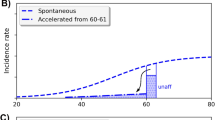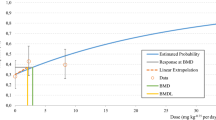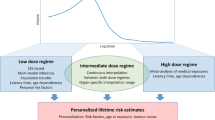Abstract
The risk of radiation-induced breast cancer decreases with increasing age at exposure. Thus, for calculating the individual risk for a patient undergoing mammography, age-related risk coefficients need to be used. In this report, the results of epidemiological studies on risks of radiation-induced breast cancer are reviewed indicating that the available data do not show the risk to be enhanced for women exposed at the age of 55 years or older. This lack of evidence is reflected by the fact that the risk coefficients recommended by national and international advisory bodies differ by a factor of 10 or more for age at exposure of 50–60 years or older. A hypothesis is proposed indicating that the risk of radiation-induced breast cancer might decrease considerably at the time of menopause. The hypothesis is based on the following line of arguments: (1) evidence has accumulated from molecular genetic studies indicating that the development of colorectal cancer requires a cascade of subsequent mutations consisting of at least seven genetic events. (2) For colorectal cancer, the annual rates of incidence and mortality increase with age to the power of 5–6. Thus, the number of mutation steps (minus 1) is approximately reflected by the power of age dependence. (3) For western populations, the incidence and mortality of breast cancer up to the age of about 50 years increase with age to the power of about 6, indicating that a similar number of genetic events might be involved in development of breast cancer as has been identified for colorectal cancer. (4) For women aged 50 years or older, breast cancer occurs at an annual rate that is about proportional to age or age squared. This may mean that after menopause, the processes in the multistep mutation cascade leading to breast cancer are slowed down by a factor of about 4 or more. (5) The constant relative risk model of radiation carcinogenesis implies for solid cancers that radiation acts by inducing additional mutations in the earlier steps of the multistep cascade. It is suggested that the break-point in the age-specific annual rate of breast cancer incidence at menopause is associated with a corresponding drop in radiation sensitivity with respect to induction of breast cancer.
Similar content being viewed by others
Author information
Authors and Affiliations
Additional information
Received: 8 January 2001 / Accepted: 20 March 2001
Rights and permissions
About this article
Cite this article
Jung, H. Is there a real risk of radiation-induced breast cancer for postmenopausal women?. Radiat Environ Biophys 40, 169–174 (2001). https://doi.org/10.1007/s004110100097
Issue Date:
DOI: https://doi.org/10.1007/s004110100097




